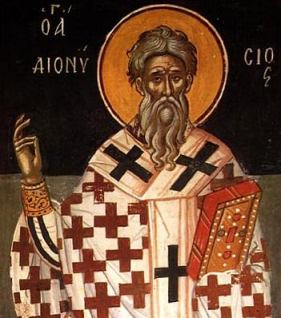Provisions for the journey
 It is the Catholic practice to give Holy Communion to those who are about to die. This is known in Latin as viaticum, literally “provisions for the journey”.
It is the Catholic practice to give Holy Communion to those who are about to die. This is known in Latin as viaticum, literally “provisions for the journey”.
I recently came across this story concerning viaticum from the third epistle from St. Dionysius The Great written in the early 3rd Century. This simple story gives us a deep look inside the life of Early Church. We see the serious consequences which were associated with apostasy (denying Christ) and we also see the ardent Eucharistic desire of one desiring reconciliation:
To Fabius, Bishop of Antioch.
I shall give an account of one particular case that occurred here. There was with us a certain Sarapion, an aged believer. He had spent his long life blamelessly, but had fallen in the time of trial [the persecution]. Often did he pray [for absolution], and no one listened to him, for he had sacrificed to idols.
He fell sick and, for three successive days, lay mute and senseless. Recovering a little on the fourth day, he called his grandchild, and said, “My son, how long will you detain me? Hurry, I beg you, and absolve me quickly. Summon one of the priests for me.” When he had said this, he became speechless again.
The boy ran for the priest; but it was night, and the man was sick, and was consequently unable to come. But I had issued an injunction, that persons at the point of death, if they requested absolution, and especially if they had earnestly sought it before, should be absolved, so that they might depart this life in cheerful hope. So the priest gave the boy a small portion of the Eucharist, telling him to steep it in water and drop it into the old man’s mouth.
The boy returned bearing the portion. As he came near but before he had yet entered, Sarapion again recovered and said, “You have come, my child, and the priest was unable to come; but do quickly what you were instructed to do, and so let me depart.” The boy steeped the morsel in water and immediately dropped it into the [old man’s] mouth.
After he had swallowed a little of it, he gave up his spirit. Is it not obvious that he was preserved in life just until he could be absolved; and, with the sin wiped away, he could be acknowledge for the many good works he had done?
– St. Dionysius The Great, Epistle 3
The Council of Nicaea actually mentioned this very thing about Viaticum as well in 325AD:
“CANON XIII.
CONCERNING the departing, the ancient canonical law is still to be maintained, to wit, that, if any man be at the point of death, he must not be deprived of the last and most indispensable Viaticum. But, if any one should be restored to health again who has received the communion when his life was despaired of, let him remain among those who communicate in prayers only. But in general, and in the case of any dying person whatsoever asking to receive the Eucharist, let the Bishop, after examination made, give it him.”
Doesn’t sound very Evangelical, does it?
Wonderful quotation Nick, thanks. I really should dig into the canons of Nicaea more – they seem to be a real treasure trove.
Welcome to the site, by the way 🙂
Hi,
Check out this post as well from a great Catholic blog I follow:
http://catholicdefense.blogspot.com/2011/04/can-protestants-accept-first-council-of.html
God Bless.
Good ol’ Joe 🙂